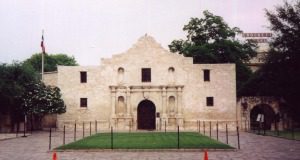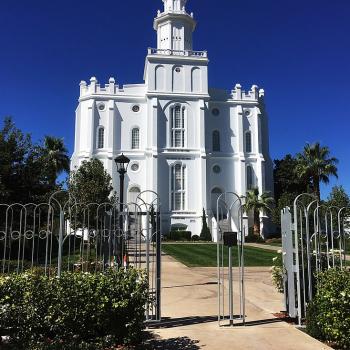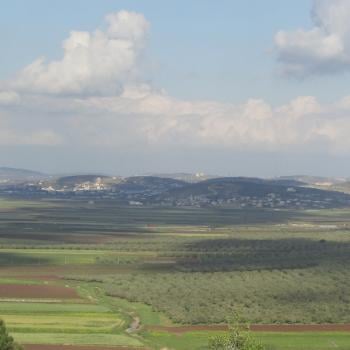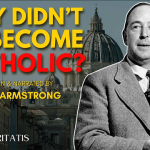
(Click to enlarge.)
Ben Park posted an interesting interview today with Jared Hickman:
http://www.juvenileinstructor.org/qa-with-jared-hickman/#more-16820
I’d like to comment on one passage from it:
“Exciting things are happening in Book of Mormon studies at the moment. Within the Mormon bubble, there seems now to be increasing support for popping that bubble by moving away from a siege mentality focused on defending the historicity of The Book of Mormon. The emergence of new interlocutors laboring under broad intellectual shifts in academia over the last several years (especially the post-secular turn) has made it so that Mormons—if they are willing and make themselves able—can now engage in scholarly conversation about their sacred book in different ways with different people, most of whom don’t have a polemical axe to grind.”
Let me say, first of all, that I’m entirely in favor of broadening the discussion of things Mormon, including Mormon scripture, to include scholars and others beyond the Mormon community. I advocated it for years within the Maxwell Institute (and within its predecessor, the Foundation for Ancient Research and Mormon Studies or FARMS). With others of my colleagues, I was delighted when Terryl Givens began to publish on Mormonism with Oxford University Press. I was pleased with Jack Welch’s work on such topics as biblical law, chiasmus, and the Sermon on the Mount, in which he often bridged the Mormon/non-Mormon gap — and continues to do so — in publications and conferences involving non-LDS scholars and audiences. I was very pleased to see John Sorenson collaborating with non-LDS scholars and publishing for non-LDS audiences. And so forth.
As I think I’ve said before (e.g., here), I have no problem whatsoever with academic approaches to scripture of all kinds. I have no problem with bracketing truth claims for certain kinds of audiences and in certain kinds of approaches. I’ve had occasional contact, over the years, with academia, I know how these things are done, and I have no problem whatever with doing them. I’ve done them myself.
That said, I have to register a gentle demurral. I think it not unreasonable to read Dr. Hickman’s reference to “a siege mentality focused on defending the historicity of The Book of Mormon” as referring, in whole or in part, to the Foundation for Ancient Research and Mormon Studies (FARMS) and to its successor organization, the pre-2012 Neal A. Maxwell Institute for Religious Scholarship. If that is correct, I wish to publicly reject and deny the claim that those of us who established and built and led what is now the Maxwell Institute were operating from within a “siege mentality” — a claim that seems, to me, to suggest something of a psychological disorder, a mental or emotional dysfunction that needs to be overcome.

Here’s Wikipedia’s definition of the term siege mentality:
Siege mentality is a shared feeling of victimization and defensiveness — a term derived from the actual experience of military defences of real sieges. It is a collective state of mind whereby one believes that one is being constantly attacked, oppressed, or isolated in the face of the negative intentions of the rest of the world. The result is a state of being overly fearful of surrounding peoples, and an intractably defensive attitude.
That simply wasn’t the mood or mindset of those who established and led FARMS and the pre-2012 Institute. Moreover, the ability of people such as John Sorenson and Jack Welch to function within the wider academic world — I choose them because they were the two people most centrally involved in the founding of FARMS, but they were and are far from alone among FARMS-types in their openness to non-LDS academia — ought surely to hint that this “siege mentality” insinuation is not only insulting (which, frankly, it is) but in need of serious correction.
Moreover, I would like to point out that, in fact — I could be wrong on this, but I rather suspect that I’m not — most of those beyond The Church of Jesus Christ of Latter-day Saints who’ve given the matter even the slightest attention don’t accept the Book of Mormon as an authentic document from the Pre-Classic Americas. To recognize this, and to argue against that consensus that the Book of Mormon is actually what it claims to be, isn’t, in my judgment, to suffer from a “siege mentality.” It’s simply to accurately perceive the real world in which Latter-day Saints live. It’s simply to comply with the scriptural mandate to “earnestly contend for the faith which was once delivered unto the saints” (Jude 1:3). And to advocate and defend a widely disputed or rejected proposition is, also, not necessarily to feel oneself besieged. It’s simply to argue for what one believes, and for what one’s community has historically affirmed.
As I’ve said before, I thought, during my last conversation with the current director of the Maxwell Institute (back in May 2012), that we had agreed that the Institute would add a Mormon studies function — a deliberate, intentional, institutional outreach to non-LDS scholars — to the functions for which the Institute had been created and built up until that time. This was perfectly alright with me. It was, actually, something I had long wanted the Institute to do.
I didn’t think then, and I don’t think now, that it was necessary altogether (or even largely) to jettison the original mission for which the Institute had been created, and for which many had generously donated funding, and for which many others had sacrificed over roughly thirty-five years, in order to enable Mormons to “engage in scholarly conversation about their sacred book in different ways with different people, most of whom don’t have a polemical axe to grind.” That option was already open to the Institute. It had always been open both to the Institute and to individual Mormon scholars, and the Institute could easily have fostered such activity without the upheavals and unpleasantness that in fact occurred. The apologetic activities of FARMS and the Maxwell Institute, and the organization’s non-apologetic but overtly Mormon publications more generally, didn’t preclude anybody from pursuing other approaches — and didn’t even bar those who wanted to pursue such other approaches from forming their own organization, if they so chose, to foster them.
The historicity of the Book of Mormon matters to most believing Latter-day Saints. They think, and the Church has always taught, that there was a real Moroni, that there were real Nephites, and that Jesus actually visited ancient America. These beliefs needn’t be asserted as true in every academic discussion of Mormonism nor even in every treatment of Mormon scripture. Scholarly conferences aren’t testimony meetings. Academic journals shouldn’t be confused with the Ensign. But it isn’t immediately obvious to me that backing away, wholly or in part, from overtly faithful Mormon scholarship in order to focus on faith-bracketing religious studies scholarship necessarily represents a net broadening of either audience or mission.
But then, it may be that I’m just paranoid, laboring under a pitiable “siege mentality.” Some, I’m sure, will eagerly take this very blog entry as decisive evidence of that.
















